 Cookies are not enabled on your browser.
Cookies are not enabled on your browser.Cookies are required for our site. Please enable cookies in your browser preferences to continue.
- Barcode / RFID / Vision
- Bulk Wire & Cable
- Cables (Terminated)
- Circuit Protection / Fuses / Disconnects
- Communications
- Drives & Soft Starters
- Enclosure Thermal Management & Lights
- Enclosures & Racks
- Field I/O
- HMI (Human Machine Interface)
- Hydraulic Components
- Motion Control
- Motor Controls
- Motors
- Pneumatic Components
- Power Products (Electrical)
- Power Transmission (Mechanical)
- Process Control & Measurement
- Programmable Controllers
- Pushbuttons / Switches / Indicators
- Relays / Timers
- Safety
- Sensors / Encoders
- Stacklights
- Structural Frames / Rails
- Tools & Test Equipment
- Valves
- Water (Potable) Components
- Wire & Cable Management
- Wire & Cable Termination
- Retired Products
Configuration Utilities
- PLC Family Selector
- P1000 PLC Systems
- P2000 PLC Systems
- P3000 PLC Systems
- ProductivityCODESYS
- CLICK PLC Systems
- Do-more® BRX PLC Systems
- LS-Electric® XGB PLC Systems
- Productivity®Open Systems
- Datalogic® Safety Light Curtains
- LS-Electric® Servo Systems
- Nitra® Pneumatic Grippers
- Object Detection (Sensors)
- PAL Controller Configurator
- Precision Gearbox Selector
- Protos X® Field I/O
- Pyrometers Selector
- Quadritalia® Modular Enclosures
- Stellar® Soft Starters
- Stepper System Selector
- SureFrame T-slot Extrusion
- SureMotion® XYZ Gantry
- SureServo2® System Selector
- SureStep® Linear Actuators
- Timing Belts & Pulleys
- Werma® Stacklights
- ZIPLinks
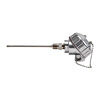
Temperature sensors are available in a wide range of probe, installation, and sensing styles. Thermocouples are made from two dissimilar metals joined at a hot junction and generate a millivolt signal as the temperature changes, while RTDs and thermistors exhibit a change in their resistance.

This page will refresh momentarily.
Warning
Some of the selected facets have been selected by the {{ assistanceData.title }} Help.
Resetting/clearing ALL facets will end {{ assistanceData.title }} Help.
![Help icon]() Selection Assistance - {{ assistanceData.title }}
Selection Assistance - {{ assistanceData.title }}
Stride Interactive Product Tour Request
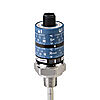
Temperature Switches
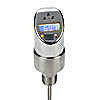
Digital Temperature Switches / Transmitters

Temperature Sensors
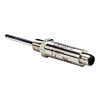
Temperature Transmitters with Integral Sensor
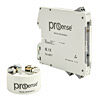
Temperature Transmitters
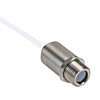
Infrared Pyrometers
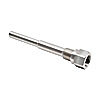
Thermowells
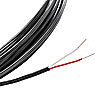
Thermocouple & RTD Extension Wire & Cable
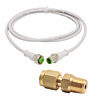
Temperature Sensors & Transmitters Accessories
Temperature Sensors
Category Selection
- Adjustable Immersion Probes
- Attached Plug Probes
- Bead Probes
- Bolt-on Ring Probes
- Connection Head Probes
- Cuttable Probes
- Flange Mount Probes
- Heat Trace Probes
- Hex Nipple Probes
- Junction Box Probes
- Lead Wire Transition Probes
- M12 Probes
- Magnet Mount Probes
- Melt Bolt Probes
- Sanitary Connection Probes
- Spade Probes
- Threaded Bolt Probes
- Room Temperature Sensors
The most commonly used temperature sensors in the automation industry are thermocouples, resistance temperature detectors (RTDs), and thermistors.
Thermocouples work based on the Seebeck effect, where a small voltage is produced across a junction of two dissimilar metals exposed to a temperature gradient. The thermocouple voltage is small, usually millivolts, and is directly related to the temperature difference across the junction. Thermocouples have a low cost, small size, wider temperature ranges, and faster response times than RTDs, but they are less accurate, are sensitive to electrical noise, and require a matching extension wire.
RTDs are devices with an internal resistance that varies with temperature in a linear way. They are typically made from fine wire wrapped around a ceramic or glass core or can be created using thin film technology. When a constant current is applied, the voltage drop across the resistance can be used to determine the temperature. RTDs have accurate, repeatable results over the long term but have longer response times and are more expensive than thermocouples.
Thermistors are sensitive, temperature-dependent resistors made from metal oxide semiconductors. The specific combination of metal oxides determines their unique temperature-dependent resistance characteristics. They are accurate, have fast response times, a compact size, and low cost, but have a limited temperature range.
For part listings and specifications, go to Shop Now
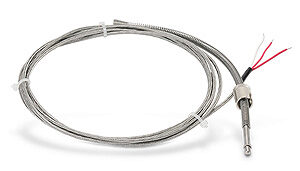
Adjustable Immersion Probes
ProSense adjustable immersion probes are designed to be inserted directly into the measured medium. They are used throughout all industries but are ideal for the plastics processing industry. These probes offer measuring ranges from -58 to 900 °F.
- Type J or K thermocouple elements with grounded or ungrounded junctions
- 3-wire PT100 RTD elements with Class A accuracy
- Spring adjustable and armor adjustable styles allow for variable immersion depths
- Integral bayonet cap makes installation and removal quick and easy when used with a bayonet adapter or pipe clamp adapter
- Made in the USA
Starting at
$29.00
(THMJ-D08L04-01)
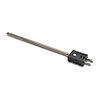
Attached Plug Probes
ProSense probes with an attached plug allow for quick and easy plug-in connections. These probes offer measuring ranges from -328 to 1700 °F.
- Type K, J, or T thermocouple elements with bendable probe
- 3-wire PT100 RTD elements with Class A accuracy
- NTC 10k thermistor Type 3 elements
- 1/8" or 1/4" diameter, 316 stainless-steel sheath
- 6", 12", or 18" probe lengths
- Made in the USA
Starting at
$26.50
(THMJ-P06-01)
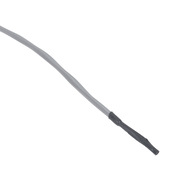
Bead Probes
The ProSense bead probe is a miniature sensor adaptable to restricted space applications. It includes a 6-foot cable pre-stripped for easy connection to the monitoring device and offers measuring ranges from -40 to 257 °F.
- NTC 10k thermistor Type 3 element
- 6-foot of cable provided with 2 inches of 24AWG wire pre-stripped 1/4 inch and tinned
- Made in the USA
Priced at
$23.50
(NTC10K3-BR01L06-01)
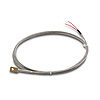
Bolt-on Ring Probes
ProSense bolt-on ring probes feature a ring terminal or washer and are bolt or screw mounted for surface temperature measurements. These probes offer measuring ranges from -58 to 900 °F.
- Type K or J thermocouple elements with grounded or ungrounded junctions
- 3-wire PT100 RTD elements with Class A accuracy
- NTC 10k thermistor Type 3 elements
- 316 stainless-steel or brass construction
- 6 ft. lead wires with stainless steel overbraid
- Made in the USA
Starting at
$23.00
(THMJ-B02L06-01)
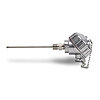
Connection Head Probes
ProSense thermocouple, thermistor, and RTD connection head probes combine the sensing element with a protective housing that encloses the wires and connections. Spring-loaded probes ensure tip contact in thermowells. These probes offer measuring ranges from -58 to 2100 °F.
- Type J or K thermocouple elements with bendable probe for easy install
- 3-wire PT100 RTD elements with Class A accuracy
- NTC 10k thermistor Type 3 elements
- 1/4" diameter, 316 stainless-steel or Inconel sealed sheath
- 4", 6", 12", or 18" probe lengths
- Cast aluminum screw cover head
- IP66, NEMA 4X protection rating
- Made in the USA
Starting at
$67.00
(NTC10K3-C06-02)
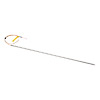
Cuttable Probes
ProSense cuttable probes provide utmost flexibility and can be trimmed to the required length of a specific application. These probes offer measuring ranges from -40 to 900 °F.
- Type J or K thermocouple elements
- 3-wire PT100 RTD elements with Class A accuracy
- NTC 10k thermistor Type 3 elements
- 1/4" diameter, 316 stainless-steel sheath
- 24" probe length can be cut using a basic tube cutter to fit the needs of the application
- Made in the USA
Starting at
$41.00
(THMJ-V24L06-01)
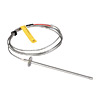
Flange Mount Probes
ProSense flange mount probes are ideal for use with ovens, freezers, ducts, or any application where through-the-wall temperature sensing is required. These probes offer measuring ranges from -40 to 900 °F.
- Available with Type J or K thermocouple elements
- 3-wire PT100 RTD elements with Class A accuracy
- NTC 10k thermistor Type 3 elements
- 1/4" diameter, 316 stainless-steel sheath
- 6", 12", or 18" probe lengths
- Made in the USA
Starting at
$37.50
(NTC10K3-F06L06-01)
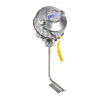
Heat Trace Probes
ProSense heat trace probes measure the surface temperature of process pipes to detect freeze-up or to help maintain the viscosity level needed for proper flow of the medium inside. These probes offer measuring ranges from -40 to 900 °F.
- Type J thermocouple element
- 3-wire PT100 RTD elements with Class A accuracy
- 1/4" diameter, 316 stainless-steel sheath for protection in harsh environments
- Flexible mounting weld pad can be formed around pipe sizes from 1" to 12"
- 3" hot leg with 1" x 2" weld pad for mounting to a pipe surface
- 4" cold leg allows for electrical connections outside of pipe insulation
- Cast aluminum, NEMA 4X/IP66 connection head with 3/4" NP conduit opening
- Made in the USA
Starting at
$74.00
(THMJ-HT34-01)
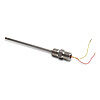
Hex Nipple Probes
ProSense thermocouple, thermistor, and RTD probes with hex nipples allow easy probe replacement and connection to a junction box. These probes offer measuring ranges from -58 to 2100 °F. Spring-loaded probe options ensure tip contact in thermowells for highly accurate temperature readings.
- Type K or J thermocouple elements with bendable probe
- 3-wire PT100 RTD elements with Class A accuracy
- NTC 10k thermistor Type 3 elements
- 316 stainless steel, 1/2 x 1/2" NPT hex nipple
- 1/4" diameter, 316 stainless steel or Inconel sealed sheath
- 4", 6", 12", or 18" probe lengths
- Made in the USA
Starting at
$51.00
(THMJ-H06L01-01)
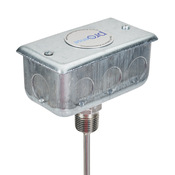
Junction Box Probes
ProSense thermistor junction box probes feature a sensing element attached to a galvanized box with knockouts for convenient connection to conduit and other electrical connectors. Spring-loaded probes ensure tip contact in thermowells. These probes offer measuring ranges from -40 to 257 °F.
- NTC 10k thermistor Type 3 elements
- 1/4" diameter, 316 stainless-steel sheath
- 4", 6", 12", or 18" probe lengths
- 2" X 4" galvanized steel junction box with multiple conduit openings
- Made in the USA
Starting at
$51.50
(NTC10K3-JB06-02)
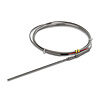
Lead Wire Transition Probes
ProSense probes with heavy-duty 6 ft. lead wire transitions are adaptable to a variety of applications and allow easy connections to extension wire. These probes offer measuring ranges from -328 to 2100 °F.
- Heavy duty lead wire transition with relief spring
- 6-foot lead wires with stainless-steel overbraid
- Type K, J, or T thermocouple elements with bendable probe
- 3-wire PT100 RTD elements with Class A accuracy
- NTC 10k thermistor Type 3 elements
- 1/8" or 1/4" Diameter, 316 stainless-steel or Inconel sheath
- 6", 12", or 18" probe lengths
- Made in the USA
Starting at
$33.50
(NTC10K3-T06L06-02)
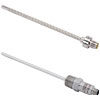
M12 Probes
ProSense RTD probes with integral M12 cable connections are perfect for attaching mating temperature transmitters. These probes offer measuring ranges from -58 to 302 °F.
- 100 ohm platinum RTD 3-wire element
- Class A accuracy
- 316 SS sheath to protect against harsh environments
- 6mm (0.24") diameter 3-wire RTD element or 10mm (0.4") diameter 4-wire RTD probes
- Probe lengths of 30mm, 50mm, 100mm, 150mm, 160mm, 260mm, and 360mm
- Process connections include 1/4"male NPT, 1/2" male NPT, or compression fitting for adjustable insertion depth
- 4-pin M12 cable connector plug for simplified wiring
Starting at
$40.50
(RTD0100-06-010-H)
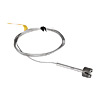
Magnet Mount Probes
ProSense magnetic-mount thermocouple probes measure the surface temperature of ferrous materials and are affixed with a convenient and non-destructive magnetic attachment. These sensors offer measuring ranges from 0 to 600 °F.
- Can be mounted vertically or horizontally
- Type J or K thermocouple elements
- Exposed junction
- Made in the USA
Starting at
$119.00
(THMJ-M01L06-01)
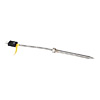
Melt Bolt Probes
ProSense melt-bolt probes measure the melt temperature of plastic as it moves down the barrel of an extruder or injection molding machine. These probes offer measuring ranges from -40 to 900 °F.
- Type J thermocouple element with grounded or ungrounded junctions
- 3-wire PT100 RTD elements with Class A accuracy
- 3" or 6" bolt lengths are available
- Flush, 1/8", 1/4" or adjustable tip lengths available
- 1/2-20 UNF thread process connection
- Made in the USA
Starting at
$51.00
(THMJ-MB3T18-01)
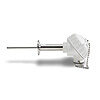
Sanitary Connection Probes
ProSense RTD probes with sanitary connections are designed for applications where corrosion and product contamination are factors. They are used extensively in the food and beverage industry and offer measuring ranges from -58 to 400 °F.
- 100 ohm platinum RTD 3-wire element
- Class A accuracy
- 1/4", 3/8" reduced to 3/16", or 6mm diameter, 316 stainless-steel sealed sheath
- 4", 30mm, 50mm, 100mm, or 150mm temperature probe lengths
- Models with FDA compliant white thermoplastic screw cover head and captive o-ring seal
- Probes with 3-A approved sanitary CIP tri-clamp and M12 cable connector
Starting at
$123.00
(RTD1-S15-030-H)
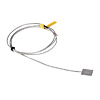
Spade Probes
ProSense spade probes have a sensing element sandwiched between two thin shims of stainless steel or sealed in epoxy between two layers of polyimide tape. Their tip can be formed and secured to the outside of tubes, pipes, or nozzles. These sensors offer measuring ranges from -40 to 900 °F.
- Type J or K thermocouple elements with grounded or ungrounded junctions
- 3-wire PT100 RTD elements with Class A accuracy
- NTC 10k thermistor Type 3 elements
- Ideal for surface temperature measurement
- Made in the USA
Starting at
$29.00
(THMJ-S01L06-01)
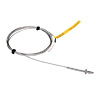
Threaded Bolt Probes
ProSense threaded bolt probes are thread-mounted and feature a 1/4-28 UNF threaded stainless steel rotating bolt for easy installation. They offer measuring ranges from -40 to 900 °F and are typically used to measure the nozzle temperature of an injection molding machine without being in direct contact with the molten plastic.
- Type J or K thermocouple elements with grounded or ungrounded junctions
- 3-wire PT100 RTD elements with Class A accuracy
- NTC 10k thermistor Type 3 elements
- Ideal for tight installations such as bearing housings and heat plates
- Made in the USA
Starting at
$32.50
(THMJ-N38P14-01)
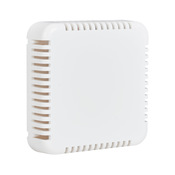
Room Temperature Sensors
ProSense wall-mount room temperature probes (indoor ambient air temperature sensors) are appropriate for indoor use in offices, warehouses, manufacturing plant floor space, and walk-in freezers. These sensors offer measuring ranges from -40 to 185 °F.
- ABS plastic ventilated cover
- Metal or plastic wall mounting subplate
- Available in thermocouple, thermistor, or RTD versions
- Internal terminal strip for wiring connections
- Can be mounted horizontally or vertically
- Made in the USA
Starting at
$28.25
(THMJ-R01-02)
Check out our job openings
Free Online PLC Training
FREE Video Tutorials
FREE e-Newsletter
Automation Notebook
Product Literature
White Papers
News, Product and Training Bulletins
E-Books
 Safe &
Secure
Safe &
Secure

We accept VISA, MasterCard, Discover, American Express, PayPal or company purchase orders.
Voted #1 mid-sized employer in Atlanta
Check out our
job openings

